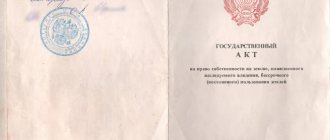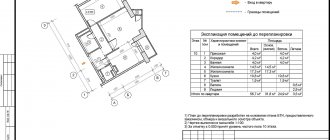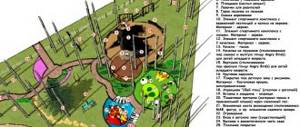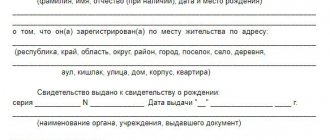The Federal Law of July 13, 2015 No. 218-FZ “On State Registration of Real Estate” (hereinafter referred to as Law No. 218-FZ) was amended in 2021 by the Federal Law of July 3, 2016 No. 361-FZ. Most of the amended provisions of Law No. 218-FZ came into force at the beginning of 2021. In this article we will look at the most important, in our opinion, parts of this Law, since its provisions and new rules for registration of property rights and registration in the cadastre take into account the European experience of registration rights to real estate and are designed to improve the real estate accounting system in the Russian Federation.
In accordance with paragraph 1 of Art. 8.1 of the Civil Code of the Russian Federation, in cases provided for by law, rights establishing the ownership of the object of civil rights to a certain person, restrictions on such rights and encumbrances of property (rights to property) are subject to state registration, which is carried out in the manner established by the legislation of the Russian Federation. Currently, this procedure is established by Federal Law No. 122-FZ of July 21, 1997 “On state registration of rights to real estate and transactions with it” (hereinafter referred to as Law No. 122-FZ). It is being replaced by the new Law No. 218-FZ.
Clause 3 of Art. 1 of Law No. 218-FZ defines the concept of state registration of rights to real estate as a legal act of recognition and confirmation of the emergence, change, transition, termination of the right of a certain person to real estate or restriction of such a right and encumbrance of real estate. This definition has not undergone any significant changes and is similar to what is contained in Art. 2 of the current Law No. 122-FZ. According to paragraph 5 of Art. 1 of Law No. 218-FZ, state registration of a right in the Unified State Register of Real Estate (USRN) is the only evidence of the existence of a registered right and can only be challenged in court.
Registration is carried out by a special federal executive body authorized by the Government of the Russian Federation - Rosreestr. It is he who maintains the state register and registers rights to real estate.
During state registration, the fact of the existence of real estate is recorded and its characteristics are given (for example, the type and type of real estate - house, land plot, etc., area, location address), information about who owns this real estate (full name of the citizen or the name of the legal entity, other data), and whether there are encumbrances (restrictions on the use, ownership and disposal of property), for example, as a result of a pledge or lease.
Is the unified register a good thing?
One of the main innovations was the formation of the Unified State Register of Real Estate by merging the databases of the Unified State Register of Rights to Real Estate and Transactions with It (USRE) and the State Real Estate Cadastre (GKN).
Until January 1, 2021, real estate turnover in the country was essentially subject to double regulation. Thus, registering an object with the State Property Committee required the provision of one set of documents, and the registration of rights to real estate of another. At the same time, a citizen or organization was forced to contact first the cadastral chamber, and then the Rosreestr department, and each of the organizations had its own requirements for documents, their execution, and its own deadline for completing registration actions, which forced them to participate in two lengthy procedures. The creation of a unified register will reduce both the time required to complete documents and lead to uniformity in requirements. So, briefly about the new.
Without reference to territory.
Documents will be accepted at any department of Rosreestr. Until January 1, 2021, the applicant had to contact the territorial authority corresponding to the location of the property. Now, if a citizen has purchased real estate in another city, he will not have to go there to register the right - he will only need to submit documents to the nearest branch in his city. You can also submit an application through the MFC.
Fewer documents from legal entities.
From January 1, 2021, legal entities are not required to submit constituent documents when registering rights, as was previously the case. Now Rosreestr employees will independently request the necessary documentation from the authorities responsible for state registration of legal entities.
Total term
registration of real estate in the cadastre and state registration of rights is reduced and will amount to, when submitting documents to Rosreestr:
5 working days - for cadastral registration; 10 working days - in case of simultaneous registration and state registration of rights; 7 working days - for state registration of rights.
If documents are submitted through the MFC, then the deadlines for cadastral registration and state registration of rights will increase by two working days.
The only case of refusal to accept documents has been identified
- if the identity of the applicant who directly applied for documents has not been established (for example, a passport or power of attorney for a representative of the organization has not been presented).
The list of grounds for returning an application and documents without consideration has been clarified.
In particular, these include:
discrepancy between the format of the application and documents submitted electronically and the established format; the presence in the application and documents presented in paper form of erasures, additions, strikeouts and other unspecified corrections, including those made in pencil, as well as the presence of damage that does not allow an unambiguous interpretation of their contents; absence of the applicant’s signature in the application for cadastral registration of the object or state registration of rights; if in the State Information System on state and municipal payments there is no information on the payment of the state duty and no document confirming its payment has been submitted; in the Unified State Register of Real Estate there is an entry about the impossibility of registering a transfer, restriction of rights and encumbrances of real estate without the personal participation of the owner or his legal representative.
Longer periods for suspension of state registration of rights have been established:
three months - by decision of the state registrar (except for certain grounds for which other suspension periods are provided); six months - at the initiative of the applicant, while Law No. 218-FZ clarifies that, upon application, suspension is possible only once.
Brief overview of the Federal Law
The Law “On State Registration of Real Estate” Federal Law No. 218 contains detailed information regarding legal relations in the field of real estate: for registration of rights, change of owner and other transactions. The regulatory act approved the need to maintain cadastral records.
The Law “On State Registration of Real Estate” 218 Federal Law regulates the types of legal relations: the sale of office premises, capital buildings, apartments and houses - all property is described in the bill. Based on a regulatory act, a citizen applies to the authorized service to legalize the transaction.
Attention! The Federal Law “On State Registration of Rights to Real Estate” regulates the procedure for legitimizing illegal construction. The owner applies to Rosreestr, providing evidence of the absence of a threat to third parties, non-violation of their rights and presenting a document confirming ownership of the land.
Notary as registrar?
Innovations in Law No. 218-FZ, which entered into force on January 1, 2017, directly include notaries as participants in relations arising during the state registration of rights.
When carrying out state registration of rights to real estate on the basis of a notarized transaction, a certificate of the right to inheritance, a certificate of ownership of a share in the common property of spouses, the accuracy of the notarized document is checked by the state registrar of rights through a unified notary information system. A notary is one of the persons upon whose application state registration of rights to a real estate object is allowed without simultaneous state cadastral registration of such an object, but only in the case where such a right arose on the basis of a notarized transaction or other notarial action performed by a notary. The notary can send such documents by electronic mail, including in the form of electronic samples of documents signed with an enhanced qualified electronic signature. At the same time, you need to understand that when sending documents by a notary electronically, you will not be able to receive from him a document with a state registration mark, since as of July 15, 2021, certificates are no longer issued when registering real estate ownership in Russia.
Federal Law on Registration of Rights to Real Estate: Comments
This law is aimed at regulating the activities of government bodies such as Rosreestr.
Today, the provisions of the law regulate the activities of not only the registry, but also the multifunctional center, since now it is the center that is vested with the right to collect and transfer documents for registration, obtain information, etc.
Particular attention should be paid to the fact that previously confirmation that a citizen is the owner was a certificate of ownership. Now (namely, since 2015), such a document as a certificate is not issued.
However, previously issued documents continue to be valid.
Who is responsible for what?
Of particular interest to citizens is the question of who is responsible for what when carrying out cadastral registration and state registration.
Responsibility for actions (inaction) during cadastral registration and state registration is distributed between Rosreestr, the state registrar and other persons. Thus, the state registrar is responsible for the discrepancy between the information entered into the Unified State Register of Real Estate and the information contained in the submitted documents (with the exception of data entered from other information resources), for unjustified suspension and refusal of cadastral registration or state registration of rights or evasion of their implementation.
Rosreestr is responsible for the improper execution of its powers, including the loss and distortion of information contained in the Unified State Register of Real Estate, the completeness and reliability of the information provided, and the illegal refusal of cadastral registration or state registration of rights established by a court decision that has entered into legal force. At the same time, there are cases when Rosreestr has the right of recourse against bodies and persons through whose fault violations were committed.
Also, innovations in Law No. 218-FZ clarify the conditions for payment of compensation for loss of the right to residential premises. Compensation for residential premises - the only one suitable for permanent residence - is paid once to the owner, who, for reasons beyond his control, does not have the right to claim it from a bona fide purchaser, as well as to the bona fide purchaser from whom it was claimed. According to Law No. 218-FZ, the condition for its payment is the impossibility of obtaining compensation from third parties established by a court decision that has entered into legal force, due to the termination of collection under an executive document, for example, in connection with making an entry on the exclusion of the debtor organization from the Unified State Register of Legal Entities. However, the provision of Law No. 218-FZ on compensation for loss of rights registered in the Unified State Register of Real Estate comes into force only on January 1, 2021.
On July 13, 2015, Federal Law No. 218-FZ “On State Registration of Real Estate” (hereinafter referred to as the Law on State Registration of Real Estate) was adopted, which comes into force on January 1, 2021. The main idea of the new law is aimed at simplifying registration procedures by combining two registers: the unified state register of rights to real estate and transactions with it (hereinafter referred to as the Unified State Register of Real Estate), containing information about rights to real estate, and the state real estate cadastre (hereinafter referred to as the State Register of Real Estate), in which takes into account individualizing information about the property; as well as to combine procedures for recording real estate objects and registering rights to them in a single body - the Federal Service for State Registration, Cadastre and Cartography (hereinafter - Rosreestr) and for a gradual transition to maintaining the register in electronic form.
With the entry into force of the new law, the Federal Law on State Registration of Rights to Real Estate and Transactions with It No. 122-FZ will no longer be in force. Significant changes will be made to the Federal Law on the State Real Estate Cadastre No. 221-FZ.
The subject of its regulation will include only the cadastral activities carried out by cadastral engineers in the preparation of documents containing information about real estate necessary for cadastral registration. Registration of real estate objects for cadastral registration, the list of documents required for this, the content and structure of documents prepared by the cadastral engineer (landmark plan, technical plan, survey report, map plan of the territory) will be regulated by the Law on State Registration of Real Estate. The Federal Law on State Registration of Real Estate provides for the creation of the Unified State Register of Real Estate (hereinafter referred to as the EGRN), which will combine data from the Unified State Register and the State Register of Real Estate. The structure of the Unified State Register of Real Estate will include: 1) a register of real estate objects (real estate cadastre); 2) register of rights, restrictions on rights and encumbrances of real estate (register of rights to real estate); 3) register of boundaries; 4) register files; 5) cadastral maps; 6) books of documents. It should be noted that a novelty in the Law on State Registration of Real Estate is that there will be no independent grounds for refusal of state registration and (or) cadastral registration. State registration and (or) cadastral registration is refused if the reasons that served as the basis for suspending the relevant procedures are not eliminated within the established period2. Even such a circumstance as the fact that the right, restriction of the right or encumbrance of the property for which the applicant is asking for registration is not subject to state registration in accordance with the Civil Code of the Russian Federation or other federal law, will be the basis for the suspension of state registration, and not for refusal of her. The Law on State Registration of Real Estate includes a very correct provision that the state registrar will check a transaction that is subject to state registration or is the basis for state registration of rights to determine if there are grounds for its nullity (subclause 13, clause 1, article 26 of the Law). The term “registry error” appears in the Law on State Registration of Real Estate (Article 61). A registration error also means an error reproduced in the Unified State Register of Real Estate, contained in a boundary plan, technical plan or survey report, which arose as a result of an error made by the person who performed the cadastral work, or an error contained in documents sent or submitted to the rights registration authority by other persons and (or) organs. A registry error is subject to correction by decision of the state registrar of rights within five working days from the date of receipt of documents, including in the order of information interaction, indicating the presence of registry errors and containing the information necessary for their correction, or on the basis of a court decision that has entered into legal force. fixing a registry error. In cases where there are grounds to believe that correction of an error may cause harm or violate the legitimate interests of copyright holders or third parties who relied on the relevant entries contained in the Unified State Register of Real Estate, such correction is carried out only by court decision. The rights registration authority also has the right to apply to the court to correct an error. The Law also defines the grounds for the responsibility of the state registrar. Losses caused to a person by improper performance by the registration authority of its powers shall be compensated in full at the expense of the treasury of the Russian Federation. The law provides for a further reduction in the terms of registration procedures, while the registration authorities also carry out cadastral registration of real estate objects. In addition, the rights registration authorities are charged with checking the contents of the transaction for a fairly wide range of grounds for suspending the relevant procedures, and the grounds for liability are determined. All this requires advanced training of employees of rights registration authorities and their retraining in terms of cadastral registration. Thus, the new law takes a significant step forward towards improving the mechanism of state registration of rights to real estate and transactions with it.
What does Federal Law No. 218 regulate?
The law regulates those relations that inevitably arise after the creation of a state register system in the Russian Federation and a procedure for mandatory registration of all acquired property. Citizens carrying out transactions involving real estate are now required to record each transaction in the Rosreestr database.
The federal law makes it easier for the state to control the movement of real estate on the market. At the same time, the rights of citizens to own property and dispose of it will not be infringed in any way. On the contrary, the registration system secures them, preventing fraudsters from carrying out illegal transactions. In addition, buyers who decide to purchase any real estate will be able to check through the Rosreestr system whether the property belongs to the seller. After all, unscrupulous sellers often try to sell something that in reality does not belong to them.
The unified Rosreestr will contain basic information regarding real estate objects. Registration for owners is a legal act, the essence of which is to document their rights. In return, citizens receive an extract containing all the necessary information regarding the property and information about its owner.
Important: without registration, the owner will not be able to freely dispose of the property. The Bill clearly reflects this. Unregistered property will be considered ownerless, which means that it is impossible to carry out any transactions with it.
Brief description of the law
Initially, the contents of the new law could be viewed in Rossiyskaya Gazeta, also on the official website, where current regulations are published.
Federal Law 218 was developed and adopted on July 13, 2015. State law is dedicated to owners when a citizen’s rights to own real estate arise, change and terminate.
Part of the content of the law is devoted to restrictions and encumbrances imposed on property.
Thus, until January 1 of this year, the procedure for state registration of owners and subsequent price accounting were regulated by Federal Law 122 (adopted on July 21, 1997) and Federal Law 221 (adopted later, on July 24, 2007). The result of changes in legislation was the adoption of Federal Law 218 in 2021, the task of which was to combine state registration of rights with general cadastral registration.
The main idea: to create a single universal system that will contain all the necessary information regarding real estate.
The revision date was initially set for January 1, 2021. With the exception of some provisions that were introduced later, on January 2, 2017. Other modifications have been postponed to the future; they will come into force only by 2021.







